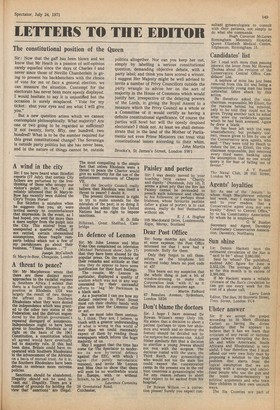A threat to peace?
Sir: Mr Macpherson wrote that there are three distinct moral approaches to the racialist regimes in Southern Africa. I submit that there is a fourth approach to the position in Rhodesia. UDI was largely the . result of two things: the affront to the Southern Rhodesians when they were denied the independence which was granted to the other two states of the Federation; and the distrust engendered by the British government's repeated disregard of assurances. Independence ought to have been given to Southern Rhodesia as of right on the basis of the 1961 Constitution, a constitution which all agreed would have eventually led to majority rule. If this had been done, Britain could have cooperated with Southern Rhodesians in the advancement of the Africans on a basis of mutual trust. As it is, the Southern Rhodesians have been driven to embrace more extreme policies.
Sanctions should be abandoned. Illegality should not be used to ' cast out' illegality. There are a number of grounds for holding the view that ' sanctions ' are illegal. The most compelling is the simple fact that unless Rhodesia were a threat to peace the Charter would give no authority for the use of the enforcement measures of Chapter
Did the Security Council really believe that Rhodesia was itself a threat to peace? I doubt it.
The present Government is right to try to make amends for the mistakes of the past; in so doing it should also admit that the United Nations had no right to impose sanctions.
H. D. Sills Hillstead, Great Shelford, Cambridge










































 Previous page
Previous page